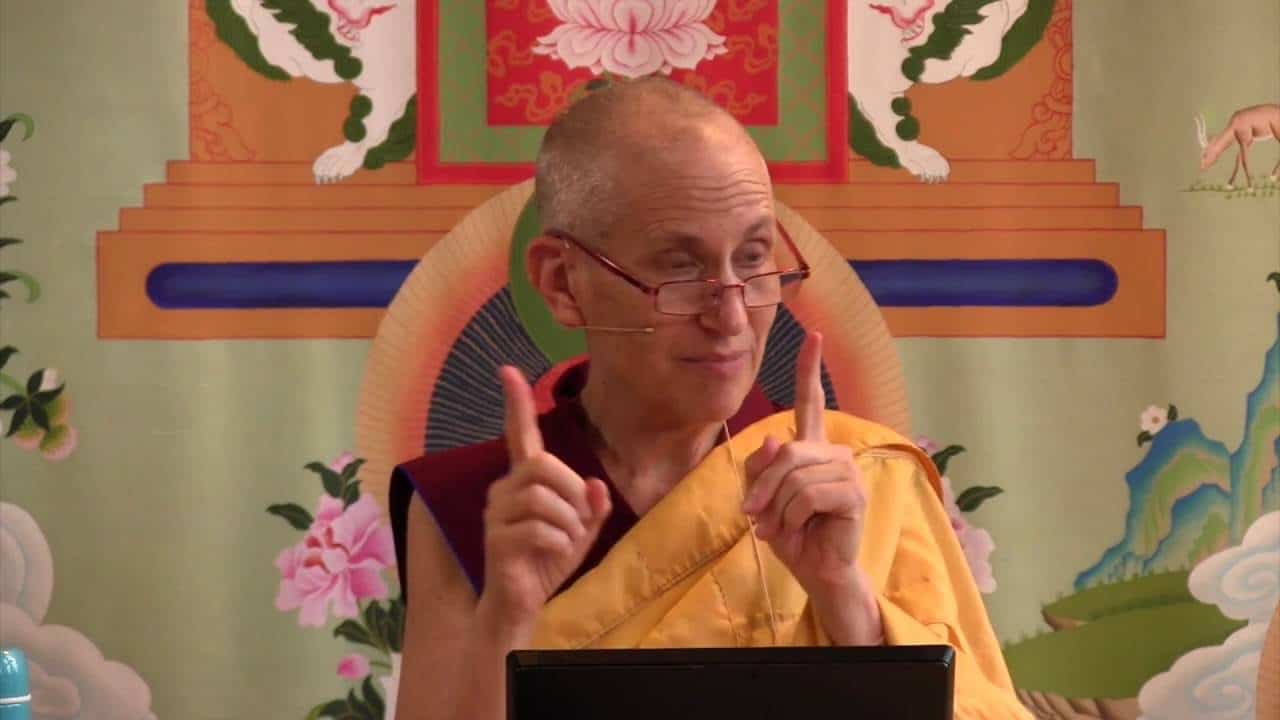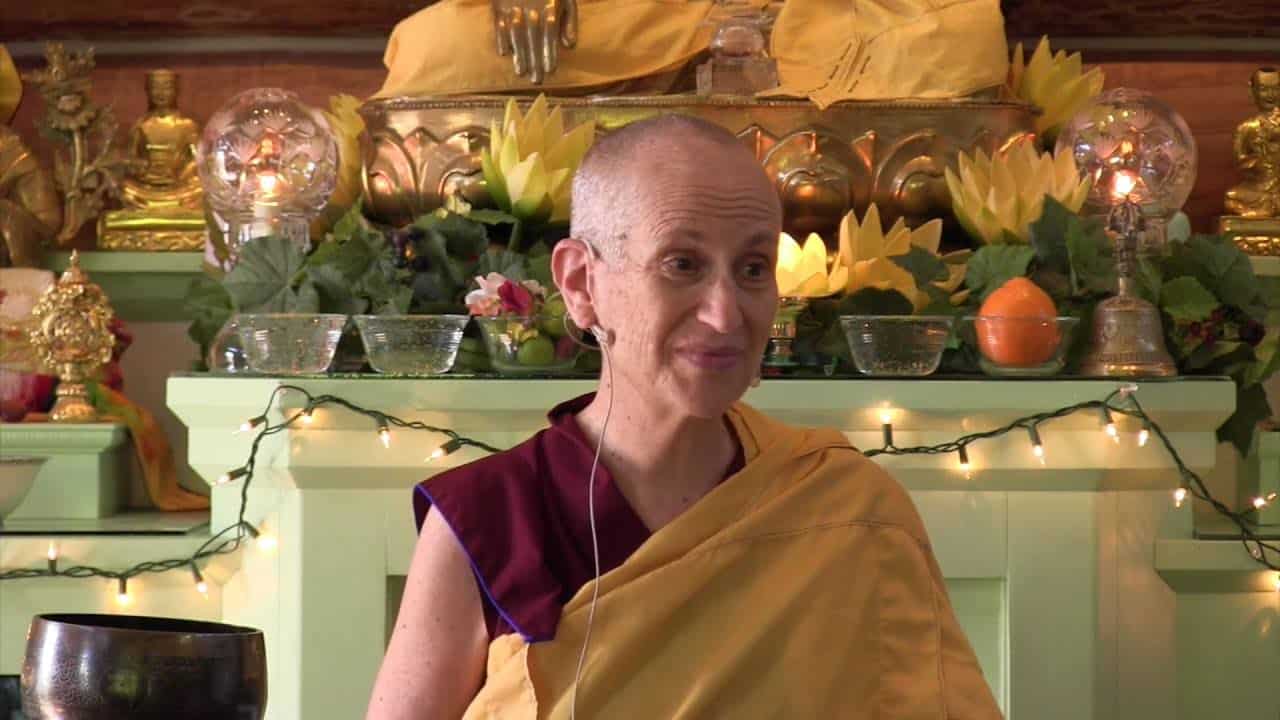The best conduct
The best conduct
Part of a series of teachings on a set of verses from the text Wisdom of the Kadam Masters.
- Who the Kadampa masters were
- The meaning of “mundane world” and being at variance with it
- Looking inside for the cause and solution to our problems
Wisdom of the Kadam Masters: The best conduct (download)
This text that we started going through quite a while ago (but didn’t finish, we got interrupted in the middle) is written by some of the Kadampa masters. The Kadampas were a strain of Buddhist practitioners who lived 11th, 12th, 13th, 14th century, and they influenced the development of the new translation schools in Tibet, the Sakya, Nyingma, and Kagyu schools. They were really wonderful practitioners. I admire them very much because they tell it like it is. They don’t sugar-coat it, they don’t dance around, they don’t do it “sandwich style” where they please your ego, then hit the point, and then please your ego some more. They just hit the point. So your ego can’t escape from it. I really appreciate that straightforward way.
They wrote this text and it’s just a series of one-liners that have very profound meaning. So we’re coming back to it. We’re at the line:
The best conduct is being at variance with the mundane world.
What’s the “mundane world”? The mundane world is our world of cyclic existence where we are always looking outside for pleasure, for happiness, and always blaming outside for our problems. Especially in the desire realm where we’re connected with our senses all the time, and so reactive to external objects, then most of our day is spent negotiating the external world so we can be with what we like and we can not be with what we don’t like. And that keeps us pretty busy, don’t you think? Because we’re always trying to make the external world be what we want it to be, make the people in it do what we want them to do and think like we want them to think. And the external world just does not cooperate with us despite all of our sagest advice and wisdom that we have for it.
Instead, people do all these things (how dare they!) that make us unhappy. Can you imagine the gall? The nerve! To do things I don’t like, that make me unhappy. And to not do what I like, that makes me happy. I mean, isn’t that the purpose of their existence? To do what I want and to make me happy? Isn’t that how we see the world? So we’re always at constant tension with the mundane world, trying to rearrange it so everything fits into our needs and our way of thinking. And the world just doesn’t cooperate.
This is actually not the problem of the world. It’s a problem with our mind. So it says:
The best conduct is being at variance with the mundane world.
Whereas the mundane world looks outside for happiness, and grabs on to external people and things. It blames our suffering, again, on external people and situations. Being at variance with this means that we look inside, and we realize that our happiness and our misery is created by our own mind. That whatever happens in the external world is just the cooperative condition, but the principal cause is in our mind.
The way our mind causes our happiness and our suffering happens in two ways. One is through the actions we do (in other words, the karma that we create), and that karma ripens in what our rebirth is, what we experience in our rebirths, our habitual way of thinking, the environment that we live in. We wind up in different situations because of the karma we created, which was created under the influence of ignorance. So, being at variance with the mundane world in that way means learning to stop the ignorance. Stopping the attachment, the confusion, anger that makes us create the negative karma. Stopping even the self-grasping that underlies our virtuous karma. And making that the center-point of what we need to focus on. Not trying control the rest of the environment and the people in it.
The second way that our mind creates our happiness and misery is how we interpret things. A situation happens and the way we describe it to ourselves is an interpretation. We think that we’re seeing an objective reality and describing an objective reality, but in actual fact, our description is dependent upon how we are interpreting things, from what perspective we are looking at things. In that way our mind can make us miserable, our mind can make us happy.
I heard a lot of you were out in the forest in the rain this morning. Some of you, I just said that, you’re smiling right now. So there, you see, how that happiness is created by your mind, because you’re looking at working out in the forest as “wow, what a fun thing to do, and I really enjoyed it.” Whereas somebody else might look at it and say, “I came all the way up here and now I have to work in the forest and get wet.” It’s the exact same situation, but somebody else could very easily complain and be tremendously unhappy. So you can see right there, just even in a situation that happened today, whether you were happy, whether you were miserable, depends on how we look at the situation. That is our mind creating our experience.
So, “being at variance with the mundane world” means looking inward, understanding how we create our experience, and then taking charge of that. Instead of feeling victimized by what happens outside, to feel empowered to create the kind of world that we want to live in, both through creating virtuous karma and through having a very positive mental state that cherishes other living beings.
This morning I was catching up on email and correspondence. I was writing a letter to one of the inmates that I’ve corresponded with for some years who lives in North Carolina. He is in for life, he is never getting out of prison. In his letter he was commenting how we get stuck in the past, looking at things with regrets, or looking with fond memories of the past. Or how we go to the future and we fantasize about the future, experiencing something that is much better than what we have now. And so he said this is the way our mundane mind works: stuck in the past, fantasizing about the future. And in the meantime missing out on what is happening right now. He was commenting on that, and how strange it is that we live in this way. And then he said that he was drinking a cup of coffee in the prison and one of his friends started laughing at him, and he stopped and asked his friend, “Why are you laughing at me? I’m just drinking a cup of coffee.” And his friend said, “Well, you look so intense.” And Al just smiled and he said, “I’m just enjoying my cup of coffee, keeping my mind here with drinking the coffee, and enjoying it.” And I thought, here is this man who is in prison for life, and prison is not a happy situation. At least not for most people. For the rich people who get imprisoned, they’re the ones who get the nice prisons. For everybody else, forget it. But here he was in prison really just enjoying his coffee, enjoying the quiet moment to drink and… I was going to say “nourish his body” but I don’t know how nourishing coffee is. But I thought this is somebody who really knows how to practice.
In a similar way, in his letter he was saying that he and another man, they work in the chapel, and they used to be able to go in the chapel unsupervised and set up for the day’s activities. But then the chaplain’s bosses made a new rule that they can’t work unsupervised in the chapel. So he was saying that his other friend who was doing that was very upset because I think they felt like they were dignified human beings being trusted to do their jobs without prison supervision. And it’s so humiliating and degrading to be treated like a child, that you can’t even set up a room without being supervised by guards or prison employees, or someone. So his friend was really kind of upset about this. And Al said, “That’s okay, now I have an extra hour in the morning to do some Dharma reading and to watch a program that I really like.” Again you can see, same situation, his friend just focused on the negative part and felt really rotten, and Al focused on the positive part and he just accepted the reality of being in prison and the rules change and they often get more restrictive.
These are small examples, but our life is made of small examples, isn’t it? As we can start transforming these small things in our lives we can really start transforming our life experience as well as the causes that we create to attain good future rebirths, and liberation, and full awakening.
Venerable Thubten Chodron
Venerable Chodron emphasizes the practical application of Buddha’s teachings in our daily lives and is especially skilled at explaining them in ways easily understood and practiced by Westerners. She is well known for her warm, humorous, and lucid teachings. She was ordained as a Buddhist nun in 1977 by Kyabje Ling Rinpoche in Dharamsala, India, and in 1986 she received bhikshuni (full) ordination in Taiwan. Read her full bio.


